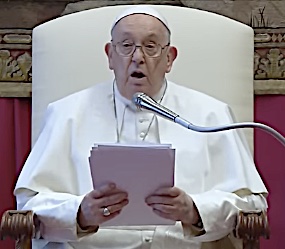Some mainly spiritual extracts from Pope Francis’ address the Diplomatic Corps at the Holy See
Benediction Hall – Monday, 8 January 2024
Dear ambassadors:
One word in particular resounds in the two principal Christian feasts (Christmas & Easter).
We hear it in the song of the angels announcing the birth of the Savior at night and we hear it again in the greeting of the risen Jesus. It is the word “peace”.
Peace is first of all a gift of God. It is he who leaves us his peace (Jn 14:27 – Peace I leave with you; my peace I give to you). But at the same time it is our responsibility: “Blessed are the peacemakers” (Mt 5:9).
To work for peace. It is a word so fragile but at the same time so demanding and rich in meaning.
I would like to dedicate our reflection today to it – in a historical moment in which it is increasingly threatened, weakened and in part lost. For that matter, it is the task of the Holy See, within the international community, to be a prophetic voice and an appeal to consciences.
On the eve of Christmas 1944, Pius XII delivered a memorable Radio Message to the peoples of the world. The Second World War was drawing to a close after more than five years of conflict – The pope said “humanity felt an ever clearer and firmer will to make of this world war, of this universal upheaval, the starting point for a new era marked by “profound renewal”.
Eighty years later, the thrust of that “profound renewal” seems to have run out, and the world is witnessing a growing number of conflicts that are slowly transforming what I have often defined as a “third world war in pieces” into a true and proper global conflict.
I cannot fail to reaffirm my concern about what is happening in Palestine and Israel at this time.
We have all been shocked by the terrorist attack against the people of Israel last October 7, in which so many innocent people were wounded, tortured and killed in an atrocious manner and in which many others were taken hostage.
I repeat my condemnation of that action and of any form of terrorism and extremism.
This is not the way in which disputes between peoples can be resolved, indeed it makes them more difficult, causing suffering to all.
In fact, what it provoked was a strong Israeli military response in Gaza that has led to the death of tens of thousands of Palestinians, mostly civilians, including many children, adolescents and young people, and has caused a very serious humanitarian situation with unimaginable suffering.
I reiterate my call on all parties involved to agree to a ceasefire on all fronts, including in Lebanon, and for the immediate release of all hostages in Gaza.
I call for the Palestinian population to receive humanitarian aid and for hospitals, schools and places of worship to be provided with all necessary protection.
I trust that the international community will resolutely promote the two-state solution, one Israeli and one Palestinian, as well as an internationally guaranteed special status for the City of Jerusalem, so that Israelis and Palestinians can finally live in peace and security.
. . . .
Behind this pictures, there is a world increasingly torn apart, but above all there are millions of people – men, women, fathers, mothers, children – whose faces are generally unknown to us and frequently overlooked.
On the other hand, modern wars no longer take place only on clearly defined battlefields, nor do they affect only soldiers.
In a context where there no longer seems to be a distinction between military and civilian targets.
There is no conflict that does not end in some way by indiscriminately hitting the civilian population. The events in Ukraine and Gaza are clear proof of this. We must not forget that serious violations of international humanitarian law are war crimes, and that it is not enough to expose them; they must be prevented. A greater commitment is therefore required from the international community to safeguard and implement humanitarian law, which seems to be the only way to protect human dignity in situations of armed conflict.
At the beginning of this year, the exhortation of the Second Vatican Council in Gaudium et Spes resounds with all its timeliness: “There are various international treaties on war and its problems, signed by many nations, to make military operations and their consequences less inhuman…. These treaties must be observed; indeed, everyone, especially the public authorities and experts in these matters, are obliged to strive as far as possible to improve them, so that the cruelty of war may be better and more effectively mitigated”. [2]
Even when it comes to exercising the right to legitimate self-defense, it is essential to adhere to a proportionate use of force.
We may not realize that civilian casualties are not “collateral damage”; they are men and women with names and surnames who lose their lives.
They are children who are orphaned and deprived of a future.
They are people who suffer hunger, thirst and cold or who are maimed by the power of modern weapons.
If we were able to look each of them in the eye, to call them by name and evoke their personal history, we would see war for what it is: only an immense tragedy and “a useless massacre” [3], which strikes at the dignity of every person on this earth.
. . . In order to achieve peace, it is not enough to eliminate the instruments of war; the root causes of war must be eradicated, the first of which is hunger, a plague that still plagues entire areas of the earth today, while in others there is considerable food wastage.
There is also the exploitation of natural resources, which enriches a few, leaving entire populations in misery and poverty, who would be the natural beneficiaries of these resources.
To this cause can be connected in a certain way to the exploitation of people, forced to work underpaid and without real prospects of professional growth.
Among the causes of conflict are also natural and environmental disasters.
Certainly there are disasters that man’s hand cannot control.
I am thinking of the recent earthquakes in Morocco and China, which have caused hundreds of casualties, as well as the one that has hit Turkey and part of Syria hard, leaving behind a tremendous trail of death and destruction.
I am also thinking of the flood that hit Derna in Libya, destroying the city, also due to the simultaneous collapse of two dams.
There are, however, disasters that are also attributable to human action or negligence and that contribute seriously to the current climate crisis, such as the deforestation of the Amazon, which is the “green lung” of the earth.
The climate and environmental crisis was the theme of the 28th Conference of the States Parties to the United Nations Framework Convention on Climate Change (COP28), held in Dubai last month, which I regret not having been able to attend personally.
That began coinciding with the World Meteorological Organization’s announcement that 2023 was the hottest year ever recorded, compared to 174 years previously.
The climate crisis demands an ever more urgent response and requires the full involvement of everyone, as well as the entire international community [5].
The adoption of the outcome document at COP28 represents an encouraging step and shows that, in the face of the multiple crises we are experiencing, there is a possibility of revitalizing multilateralism through the management of the global climate issue, in a world where environmental, social and political problems are closely intertwined. . . .
Dear Ambassadors
The path to peace demands respect for life, for every human life, beginning with that of the unborn child in the womb, which cannot be suppressed or turned into a commercial product.
In this sense, I consider deplorable the practice of so-called surrogate motherhood, which gravely offends the dignity of the woman and the child; based on the exploitation of the mother’s situation of material need.
A child is always a gift and never the object of a contract.
I therefore call upon the international community to commit itself to the universal prohibition of this practice.
At every moment of its existence, human life must be preserved and protected, even though I note with regret, especially in the West, the persistent spread of a culture of death which, in the name of a false compassion, discards children, the elderly and the sick.
The road to peace requires respect for human rights, according to the simple but clear formulation contained in the Universal Declaration of Human Rights, whose 75th anniversary we recently celebrated. These are rationally self-evident and commonly accepted principles.
Unfortunately, attempts in recent decades to introduce new rights, not entirely compatible with those originally defined and not always acceptable, have given rise to ideological colonizations, among which gender theory occupies a central place, which is extremely dangerous because it erases differences in its claim to equalize everyone.
Such ideological colonizations provoke wounds and divisions between States, instead of favoring the construction of peace.
Dialogue, for its part, must be the soul of the international community.
The current situation is also due to the weakening of the structures of multilateral diplomacy that emerged after World War II.
These organizations, which were created to promote security, peace and cooperation, no longer succeed in bringing all their members together around the same table.
There is a risk of “monadology” and fragmentation into clubs that only admit States considered to be ideologically aligned.
Even hitherto effective organizations focused on the common good and on technical issues risk being paralyzed by ideological polarization and instrumentalized by certain States.
In order to relaunch a common commitment to the service of peace, it is necessary to recover the roots, spirit and values that gave rise to these organizations, while taking into account the new context and paying due attention to those who do not feel adequately represented by the structures of international organizations.
Of course, dialogue requires patience, perseverance and listening skills, but when a sincere attempt is made to end discord, significant results can be achieved.
I am thinking, for example, of the Belfast Agreement, also known as the Good Friday Agreement, signed by the British and Irish governments, the 25th anniversary of which was commemorated last year. Putting an end to thirty years of violent conflict can be taken as an example to encourage and stimulate the authorities to believe in peace processes, despite the difficulties and sacrifices they require.
The road to peace goes through political and social dialogue, since it is the basis for civil coexistence in a modern political community.
In 2024, elections will be held in many states.
Elections are a fundamental moment in the life of a country, since they allow all citizens to responsibly choose their rulers.
The words of Pius XII resonate today more than ever: “To express one’s opinion on the duties and sacrifices imposed on him; not to be obliged to obey without having been heard: these are two rights of the citizen which find their expression in democracy, as its very name indicates. By the solidity, harmony and good fruits of this contact between the citizens and the government of the State, one can recognize whether a democracy is truly healthy and balanced, and what is its strength of life and development” [9].
Therefore, it is important that citizens, especially the younger generations who will be called to the polls for the first time, feel that it is their main responsibility to contribute to the construction of the common good, through free and informed participation in voting.
On the other hand, politics must always be understood not as the appropriation of power, but as the “highest form of charity” [10] and, therefore, of service to others within a local and national community.
The path to peace also passes through interreligious dialogue, which requires above all the protection of religious freedom and respect for minorities.
It pains us, for example, to note that more and more countries are adopting models of centralized control of religious freedom, with the massive use of technology.
Elsewhere, minority religious communities often find themselves in an increasingly dramatic situation. In some cases they are in danger of extinction, due to a combination of terrorist actions, attacks on cultural heritage and more underhand measures such as the proliferation of anti-conversion laws, manipulation of electoral rules and financial restrictions.
Of particular concern is the increase in acts of anti-Semitism that have occurred in recent months, and I would like to reiterate once again that this scourge must be eradicated from society, especially through education in fraternity and acceptance of the other.
Equally worrisome is the increase in persecution and discrimination against Christians, especially in the last decade. It is not infrequently the case, albeit in a bloodless but socially relevant way, of those phenomena of slow marginalization and exclusion from political and social life and from the exercise of certain professions that occur even in traditionally Christian lands. In total, more than 360 million Christians around the world suffer a high degree of persecution and discrimination because of their faith, and more and more of them are forced to flee their countries of origin.
Finally, the road to peace is through education, which is the main investment in the future and in the younger generation.
I still have vivid memories of the World Youth Day held in Portugal last August.
While thanking once again the Portuguese authorities, both civil and religious, for their efforts in organizing it, I keep in my heart the meeting with more than a million young people from all over the world, full of enthusiasm and zest for life.
Their presence was a great hymn to peace and a testimony that “unity is superior to conflict” [11] and that it is “possible to develop communion in differences” [12].
In modern times, part of the educational challenge concerns the ethical use of new technologies.
These can easily become instruments of division or of spreading lies, such as the so-called fake news; but they are also a means of encounter, of mutual exchange and an important vehicle for peace.
“The remarkable progress of the new information technologies, especially in the digital sphere, therefore presents interesting opportunities and serious risks, with serious implications for the pursuit of justice and harmony among peoples” [13].
his is why it seemed important to me to dedicate the annual World Day of Peace Message to artificial intelligence, which is one of the most important challenges of the coming years.
It is essential that technological development be carried out in an ethical and responsible manner, preserving the centrality of the human person, whose contribution cannot and will never be replaced by an algorithm or a machine.
“The intrinsic dignity of each person and the fraternity that unites us as members of the one human family must underpin the development of new technologies and serve as unquestionable criteria for evaluating them prior to their use, so that digital progress can take place while respecting justice and contributing to the cause of peace” [14].
It is therefore necessary to reflect carefully at all levels, national and international, political and social, so that the development of artificial intelligence remains at the service of mankind, fostering and not hindering – especially in young people – interpersonal relationships, a healthy spirit of fraternity and critical thinking capable of discernment.
In this perspective, the two Diplomatic Conferences of the World Intellectual Property Organization, which will take place in 2024 and in which the Holy See will participate as a member State, take on particular relevance.
For the Holy See, intellectual property is fundamentally oriented to the promotion of the common good and cannot be detached from ethical constraints as this would lead to situations of injustice and undue exploitation.
Particular attention must also be paid to the protection of the human genetic heritage, preventing practices contrary to human dignity, such as the patenting of human biological material and the cloning of human beings.
Excellencies, Ladies and Gentlemen
In this year the Church is preparing for the Jubilee which will begin next Christmas.
I am particularly grateful to the Italian Authorities, both national and local, for the efforts they are making to prepare the city of Rome to welcome numerous pilgrims and to enable them to draw spiritual fruit from the Jubilee journey.
Perhaps today more than ever we need the Jubilee Year.
In the face of so much suffering, which causes despair not only in the people directly affected, but in all our societies; in the face of our young people, who instead of dreaming of a better future often feel powerless and frustrated; and in the face of the storm clouds that, instead of receding, seem to hang over the world, the Jubilee is the announcement that God never abandons his people and always keeps open the doors of his Kingdom.
In the Judeo-Christian tradition, the Jubilee is a time of grace in which God’s mercy and the gift of his peace are experienced.
It is a time of justice in which sins are forgiven, reconciliation overcomes injustice and the earth rests.
It can be for all – Christians and non-Christians alike – the time when swords are broken and from them ploughshares are made; the time when one nation no longer lifts up the sword against another, nor learns the art of war (cf. Is 2:4).
This is my heartfelt wish, dear brothers and sisters, the wish I express with all my heart to each of you, dear Ambassadors, to your families, to your collaborators and to the peoples you represent.
Thank you and Happy New Year to all!


